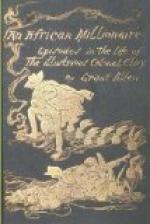I respected his feebleness. I did not even make it a fitting occasion to ask for a trifling increase of salary.
V
THE EPISODE OF THE DRAWN GAME
The twelfth of August saw us, as usual, at Seldon Castle, Ross-shire. It is part of Charles’s restless, roving temperament that, on the morning of the eleventh, wet or fine, he must set out from London, whether the House is sitting or not, in defiance of the most urgent three-line whips; and at dawn on the twelfth he must be at work on his moors, shooting down the young birds with might and main, at the earliest possible legal moment.
He goes on like Saul, slaying his thousands, or, like David, his tens of thousands, with all the guns in the house to help him, till the keepers warn him he has killed as many grouse as they consider desirable; and then, having done his duty, as he thinks, in this respect, he retires precipitately with flying colours to Brighton, Nice, Monte Carlo, or elsewhere. He must be always “on the trek”; when he is buried, I believe he will not be able to rest quiet in his grave: his ghost will walk the world to terrify old ladies.
“At Seldon, at least,” he said to me, with a sigh, as he stepped into his Pullman, “I shall be safe from that impostor!”
And indeed, as soon as he had begun to tire a little of counting up his hundreds of brace per diem, he found a trifling piece of financial work cut ready to his hand, which amply distracted his mind for the moment from Colonel Clay, his accomplices, and his villainies.
Sir Charles, I ought to say, had secured during that summer a very advantageous option in a part of Africa on the Transvaal frontier, rumoured to be auriferous. Now, whether it was auriferous or not before, the mere fact that Charles had secured some claim on it naturally made it so; for no man had ever the genuine Midas-touch to a greater degree than Charles Vandrift: whatever he handles turns at once to gold, if not to diamonds. Therefore, as soon as my brother-in-law had obtained this option from the native vendor (a most respected chief, by name Montsioa), and promoted a company of his own to develop it, his great rival in that region, Lord Craig-Ellachie (formerly Sir David Alexander Granton), immediately secured a similar option of an adjacent track, the larger part of which had pretty much the same geological conditions as that covered by Sir Charles’s right of pre-emption.
We were not wholly disappointed, as it turned out, in the result. A month or two later, while we were still at Seldon, we received a long and encouraging letter from our prospectors on the spot, who had been hunting over the ground in search of gold-reefs. They reported that they had found a good auriferous vein in a corner of the tract, approachable by adit-levels; but, unfortunately, only a few yards of the lode lay within the limits of Sir Charles’s area. The remainder ran on at once into what was locally known as Craig-Ellachie’s section.




